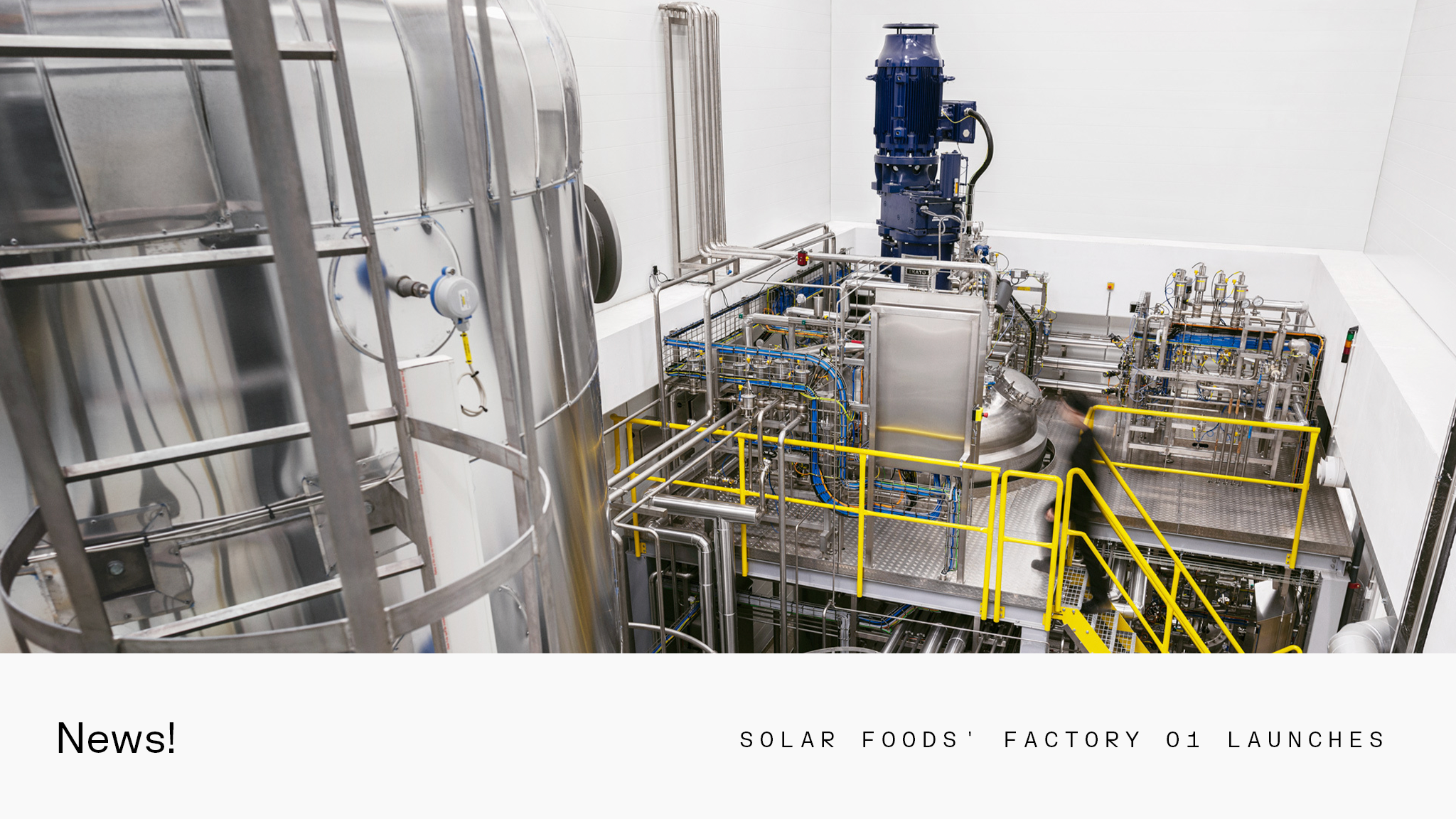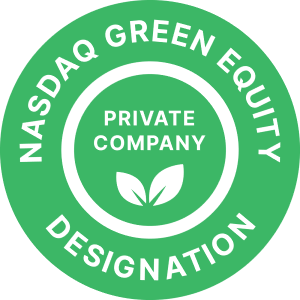🇫🇮 Opening a window to the food industry’s future: the world’s first factory growing food out of thin air launches

Factory 01, Solar Foods’ first commercial-scale production facility of Solein®, starts production in Vantaa, Finland. It marks the beginning of the commercialisation of the novel protein and showcases what the future of food production could look like.
Solein® is the revolutionary protein grown out of a tiny but mighty micro-organism with CO2 and electricity by the Finnish foodtech company Solar Foods. This nutritious yellow powder, highly functional and compatible with a wide range of traditional ingredients, has long been contained to small quantities: only the Solar Foods pilot laboratory in Espoo, neighbouring the Finnish capital Helsinki, has produced Solein.
This is now changing as Solar Foods officially kickstarts the operation of Factory 01, its first commercial-scale Solein facility.
Solein received its first novel food regulatory approval in Singapore in 2022. Solar Foods has provided the novel ingredient for limited-edition food products and test marketing in Singapore, such as a Solein-powered snack bar and a Solein chocolate gelato. Solar Foods estimates Factory 01 will ramp up Solein’s annual production up to a maximum of 160 tons, enabling future co-operations to push beyond these limitations.
“We will be able to deliver quantities that allow food producers for the first time to create large batches of Solein-powered products. While we have been able to offer consumers a small taste, finding a Solein-based food in your local supermarket has not been possible. Soon it will be”, Solar Foods’ CEO and co-founder Pasi Vainikka explains.
A quantum leap in farming
Beyond the major step the facility represents for the company’s business, it is also a historic first of its kind for cellular agriculture. Factory 01’s bioreactor grows the same amount of Solein protein per day as a 300-cow dairy farm would produce milk protein – and does this all while being entirely decoupled from the demands and environmental stresses of traditional agriculture. Vainikka likens its significance to food production to the impact quantum computing will have on information processing.
“Just like with quantum computers, it’s no longer a question of will cellular agriculture become a thing: it’s evident that it will. The question is more about who leads the charge”, he says. ”We are exploring the possibilities of this scientific platform on a new scale. Factory 01 demonstrates it is possible to grow protein from start to finish under one roof, year-round even in the harsh Northern conditions of Finland – and to do it all sustainably and in a commercially viable manner.”
Factory 01 is also a part of the European hydrogen economy. The factory is the European Commission’s first hydrogen IPCEI project (Important Project of Common European Interest) to be completed. Solar Foods’ €600 million investment programme was in September 2022 notified as a hydrogen IPCEI project with a maximum state aid of €110 million; the company received the first grant of €34 million in December of the same year.
Next steps: scaling further and new markets
Factory 01 is a high-tech and highly automated facility. Much like in other modern food production, the factory’s “farmers” will do most of their work in the facility’s control room rather than on the factory floor. Factory 01 will also serve as Solar Foods’ hub for R&D and future product development. Running the facility will provide valuable data and on the path to the next milestone: Factory 02.
“Factory 01 is already a bona fide factory, the kind you could see in an industrial park. But to realise Solein’s full potential, we think bigger. That’s why Factory 02 will eventually scale up the bioprocess as well as the production process: it would not be located in an industrial park, it would more likely fill an industrial park”, Vainikka explains the company’s vision for growth. “Our long-term aim is to be a billion euro company. The global protein market is a two trillion euro business and we have shown that Solein has a place within that market.”
In May 2023, Solar Foods agreed on a strategic alliance to develop and test market Solein-based products in Singapore with the Japanese food giant Ajinomoto Group. The two companies are also looking to expand their cooperation to countries and regions beyond Singapore.
Solar Foods is seeking novel food regulatory approvals for Solein on several key markets, such as the EU, the UK, and the United States. The company’s aim is to enter the United States market in late 2024.
Solar Foods received a Nasdaq Green Equity Designation – Private Companies from the Nasdaq Stock Exchange on April 11, 2024.
What is Solein?
- Solein is a microbial protein-rich powder that contains all the essential amino acids. It can be used to replace existing proteins in a variety of foods, for example in alternative dairy and meat, different snacks and beverages, noodles and pasta, or breads and spreads. It is the first ever novel food disconnected from the limits of traditional agriculture. This type of production method has the potential to transform the sustainability, availability, and transparency of what we eat and where food can be produced.
- Solein is produced using a bioprocess where microbes are fed with gases (carbon dioxide, hydrogen, and oxygen) and small amounts of nutrients. The bioprocess resembles winemaking, with carbon dioxide and hydrogen replacing sugar as the source of carbon and energy, respectively.
- Solein is 65-70% protein, 5-8% fat, 10-15% dietary fibres and 3-5% mineral nutrients. The macronutrient composition of Solein cells is very similar to that of dried soy or algae. Solein provides iron and B vitamins and is exceptionally functional. Solein can be used with a wide variety of other ingredients: it vanishes into foods and doesn’t change the taste of familiar, everyday food products.
- The production of Solein is not reliant on agriculture, weather, or climate: it can be produced in harsh conditions such as deserts, Arctic areas, even space. The process does not require animals or photosynthetic plants, making Solein the world’s most sustainable protein. Growing a kilogram of Solein requires approximately 1% of the water and 5% of the arable land that growing an equivalent amount of plant protein would, and creates only a fifth of the carbon dioxide emissions in the process.
- Solein will become available for commercial use for the first time. It is aimed at food brands looking for nutritious, functional, and sustainable protein ingredients of consistent quality that can be reliably delivered for their products. Singapore was the first market to grant Solein regulatory approval, but Solar Foods is also seeking authorisations in other markets across the world.
Learn more about Solein at Solein.com
Discover more about Factory 01
For more information and media inquiries:
Laura Sinisalo
CXO, Solar Foods Ltd.
la***@so********.com
+358 10 579 3285
About Solar Foods
Solar Foods produces protein using carbon dioxide and electricity. Solein® production, independent of weather and climate conditions, liberates global protein production from the constraints of traditional agriculture. Solar Foods was founded in Finland in 2017. solarfoods.com
Originally published on 15 April by Solar Foods.
Announcements are published as a service to readers. The sender is responsible for all content.
Announcements for publication can be submitted to pr***********@ar**************.com.

